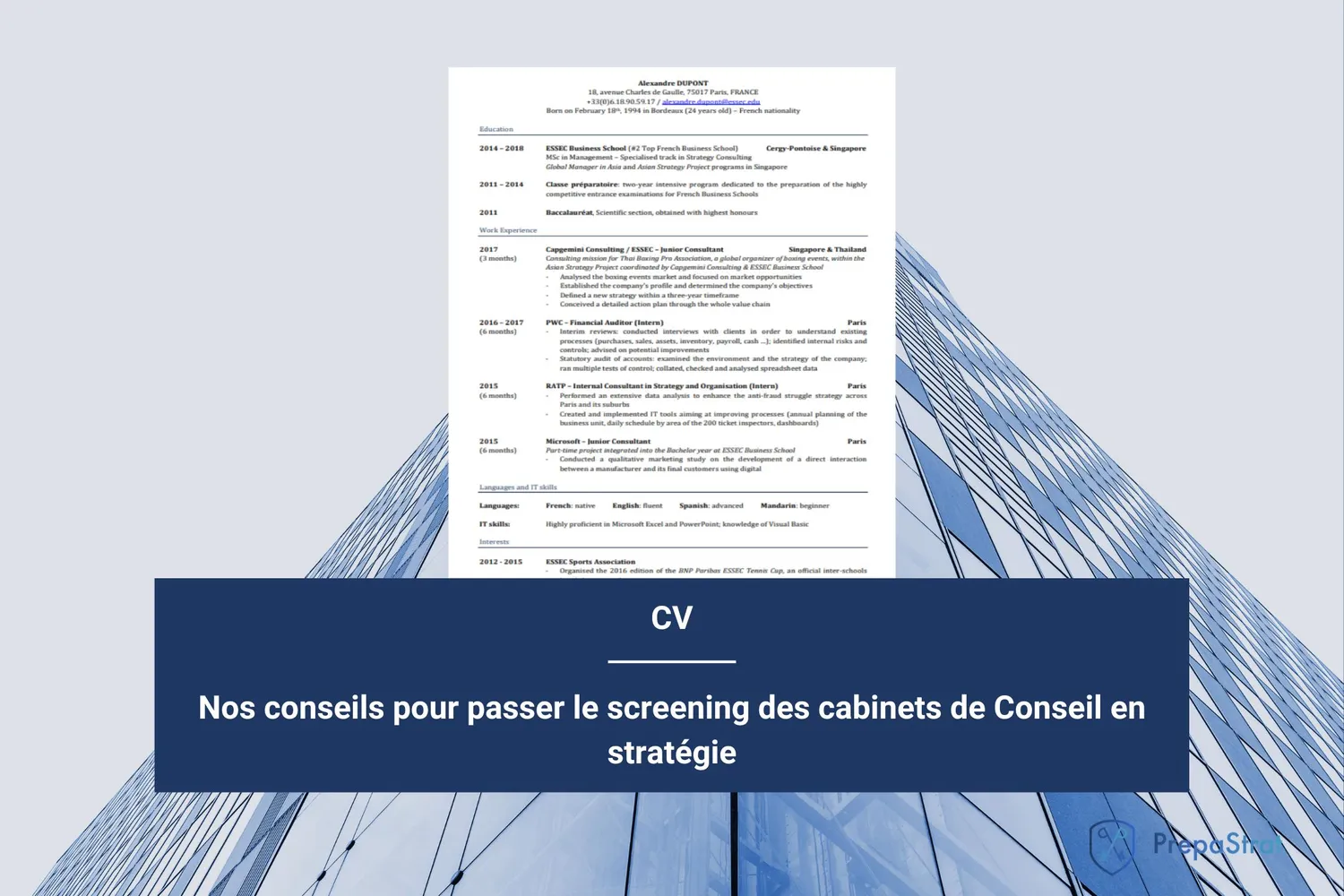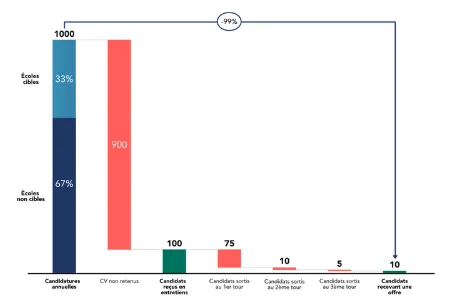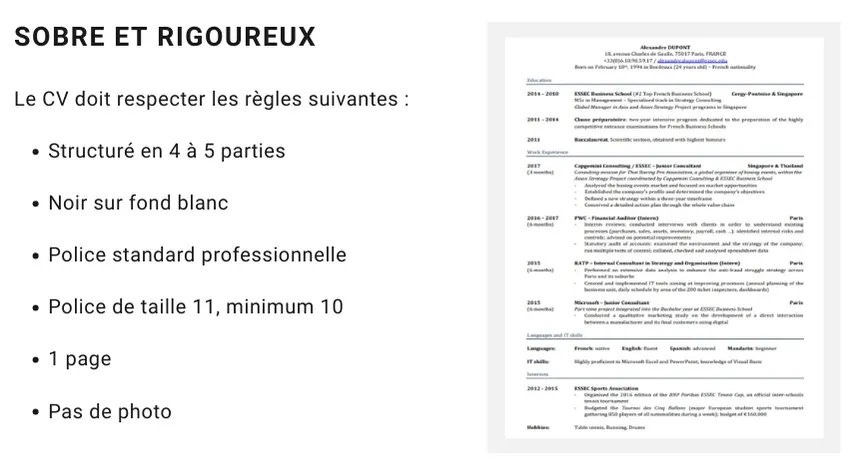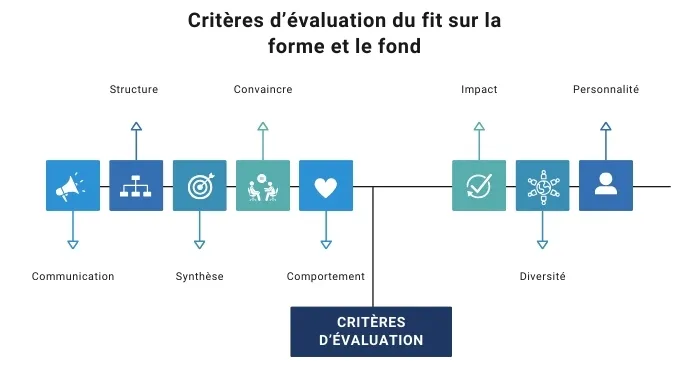
A key element of your application, your CV must be written to perfection if you don't want to flunk out. Working as a strategy consultant demands a rigorous approach at all times, which you need to emphasize as soon as you write your CV. In terms of form, it must be impeccable and perfectly coherent from start to finish. In terms of content, you need to highlight the basic elements that will help us understand your career path, and the differentiating elements that will enable you to stand out from the crowd.
Here are some tips on how to write a CV that may just enable you to be one of the few candidates interviewed by strategy consulting firms.
The importance of the CV in the strategy consulting recruitment process
The CV: essential for screening
One of the most difficult aspects of joining a strategy consulting firm is passing the screening. First of all, there are prerequisites concerning your academic and professional background, which you can find in our article "How to get into a strategy consulting firm". Ideally, you should be a member of a target school, and at best you should have done a preparatory class and selective internships. Then, even if you have the perfect profile, you need to have an even more than perfect CV to pass that famous screening.
Screening is the study of applications received by the firm. It is carried out by human resources in the larger firms, and by consultants in the smaller ones. Real committees are set up to go through the applications received with a fine-tooth comb. For the same candidate, two or three people will sometimes look at the CV and cover letter. It should be noted that, depending on the firm, the cover letter is sometimes not read or even requested, which makes the CV the most important element. Whether it's human resources or consultants who take over your CV, the requirements are the same, as they are in the world of strategy consulting.
Rigor is a must. On a day-to-day basis, strategy consultants apply the utmost rigor to their analysis and production work. It's what they're all about, and when they have 30 seconds to look at a CV, the slightest error can be eliminatory. You'll be judged first on form, where in just a few seconds the recruiter will be able to form an initial impression of you. Next, you'll be judged on substance, where your academic background and professional experience will be analyzed. If everything is clear, both in form and content, and you match the profile we're looking for, then you have a good chance of passing this first screening stage.
As a reminder, on average only 10% of candidates pass the screening and are interviewed by strategy consulting firms. That's why it's so important to have an impeccable CV, especially as its role doesn't end with screening.

The CV: a reference document for the fit part of strategy consulting interviews
The only document the interviewer receives for the interview is usually the CV. The interviewer will then take a few minutes to go through it, and will only need a few seconds to get a first impression of you. If you've passed the screening, your CV is clear enough and meets the firm's expectations. It will now be studied in depth during the interview.
The CV allows the interviewer to feed into the fit part of the Strategy Consulting interview, which lasts an average of 15 minutes. After your presentation, the interviewer will ask you questions on various elements to assess you on three dimensions:
- Skills: Is this person right for strategy consulting?
- Motivation: Is this person right for my practice?
- Personality: And finally, do I want to work with this person?
The interviewer's questions will be based on your introductory pitch, your answers to his or her questions, and what's written on your CV. The interviewer will be keen to dig into your original experiences, your associative commitments if you have any, or the interests you have put forward. Also, if you have something in common, such as a school, an association or a hobby, the interviewer will certainly ask you about it.
The construction of your CV must therefore be strategically thought through in relation to the questions you wish to ask. With your CV, you have the opportunity to put forward the experiences that best reflect your skills, motivation and personality as a strategy consultant. All that remains is to have a perfect CV, both in form and content, that meets the expected standards with the following assets: structure, readability, impact and relevance.
Read also: Preparing for a successful fit in strategy consulting
CV form: sober and rigorous
Even if the aim is to stand out from the crowd of applicants, it's important to realize that there are elements that help you stand out from the crowd, and others that don't. The CV is a document that will speak for you during screening and before your interviews. The CV is a document that will speak for you during screening and before your interviews, which means that you won't be there to explain your choices and defend yourself on why you're outside the norm. In just a few seconds, the consultant reading your CV should be able to say to himself that you're already a good candidate, and not ask any questions.
The format: keep it classic with a professional layout

You would be taking an unnecessary risk in differentiating yourself on the form of your CV. Don't opt for an original format. Content yourself with a classic format that will place you in the basket of CVs to be read.
- Structure it with main headings: academic, professional, associative, skills, interests, etc.
- Write it in black on a white background
- Use a professional standard font such as Arial, Times New Roman or Calibri
- Use a size 11 font or one that never falls below 10.
- Make a 1-page CV
To the traditional question: should I put a photo on my CV? Our answer is no. No one will criticize you for not putting one, and most firms follow Anglo-Saxon and American standards, which ban photos to avoid any form of discrimination.
You can easily start from an existing format, the simplest being to call on your professional network and particularly alumni of your school or university who have gone through the same path as you. You can also ask your school's Career Center to provide you with a few sample CVs.
At first glance, your CV should be pleasing to the eye, with a spaced-out, clear, easy-to-read layout and, above all, a structured approach. To achieve this, you need to prioritize your information!
- Structure and sequence your CV by skipping a line before and after each heading.
- Boldly highlight experience titles
- Italicize additional details
- Use bullet points to detail your experiences
- Don't overdo it either: beyond that, no fancy formatting!
Your CV must be consistent in form from start to finish to ensure the best possible readability.
- All alignments must be equal, so learn to use Word's Rulers function or create tables to ensure correct alignments.
- All formatting must be consistent:
- If you use bold for titles, all titles must be in bold
- If you put the dates on the left and the location on the right, all the dates must be aligned on the left and the locations on the right.
- If you use bullet points, keep a single shape for all your points, starting with the black background style and then the white background style if you have bullet points in your bullet points.
CV language, style and spelling
We recommend that you write your CV in English, so that you only have to produce one document, which will go everywhere. You won't have to translate it if you're applying to foreign offices. What's more, some firms, such as Oliver Wyman in the Paris office, only ask for applications written in English.
- Describe your experiences using the past participle: created, realised, conducted...
- Keep this same style throughout your CV to remain consistent and don't start illustrating a new experience with another form such as: creation of...
Finally, pay attention to spelling and typographical errors. Many CVs have one or more typos in their final version, and at this level of competition, it's a direct elimination of your application. To avoid these errors, have your CV proofread by different people, or use online software that analyzes and double-checks your CV.
These rules of rigor are essential in strategy consulting, and are a constraint respected by consultants when drafting their own working documents. A candidate who does not respect this rigor will automatically be seen as being out of touch with classic consultant standards.
See also: Everything you need to know about the consulting profession
The substance of the CV: adopt a consultant's posture to sell yourself
Respect a precise and hierarchical structure for your information
The CV should be considered as a presentation tool. No sentences and an average of one line per bullet point, two lines maximum. It must therefore be concise and no longer than one page. It must respect a precise structure.
Your CV should begin with your contact details:
- First name Last name
- E-mail address / Telephone number
Then you need a clear title that says exactly what you're looking for:
- Looking for a/Candidate for a 6-month internship starting January 2025
- Looking for a/Candidate for a CDI from January 2025
Finally, you should structure your CV according to the following 5 categories:
- Training
- Professional experience
- Associative experience
- Skills: languages and tools
- Interests
The professional experience section is the most important, so it should be the longest and most detailed. If you don't have enough space, you can combine your skills and interests in a single category.
Highlight relevant and impactful experiences for Strategy Consulting
Your CV should be consultancy-oriented, with experiences that are relevant to the job of strategy consultant. Take a look at each of your experiences and ask yourself these two questions:
- Is it important enough to merit a place on my CV?
- If so, what did it teach me and what did I learn that would make me a good consultant?
Your CV is one of the main sources of information for your interviewer when testing you on the fit. As a reminder, the evaluation criteria will be as follows.

Eliminate the oldest or least significant experiences and reformulate your main experiences so as to orient them towards the consulting profession. You don't need to reinvent your experience, just use a consulting vocabulary and approach. In terms of content, here's our main advice:
- Make your academic training category interesting
- Don't fall into the trap of listing the courses you've taken during your program, whether at business school, engineering school or university.
- Instead, highlight distinctive elements: your choice of specialization, your dissertation topic, your academic exchange, a project carried out during a course, and so on.
- Present your experiences chronologically within each category
- Prioritize the experience that is most relevant to strategy consulting, and the most recent.
- Try to have the same amount of description per experience, but always give priority to the most recent and relevant experiences if necessary.
- Quantify your experiences as much as possible
- Think like a consultant, with a requirement for results and your ability to demonstrate the impact you've had.
- For example, don't write: "management of X key accounts in communication", but rather: "X% increase in sales by resolving Y crisis situations for Z key accounts" or: "management of a €10M asset portfolio with 10% growth".
- Highlight key skills specific to the strategy consulting profession
- Through your experience, demonstrate that you have acquired skills in data analysis, media production and document synthesis.
- Demonstrate your communication skills, leadership, autonomy and pro-activeness.
- Stay humble and control the content of your CV
- Don't forget that your experiences are mainly internships. Don't fall into the trap of "international development of the LV brand worldwide" when you've only had 3 months to do it without even mastering Office tools.
- Before sending in your CV, make sure you're comfortable with all the skills you've put forward, as the recruiter will be sure to test them if he or she gets the chance. Anticipate all these eventualities!
- Don't get ahead of yourself: a "bilingual Spanish" rating can earn you a full interview in Spanish, provided the recruiter is able to test this.
- Don't lie about your experience. Firms do background checks after recruitment if you receive an offer, and some consultants may know people where you've been before.
Finally, test your CV as much as possible before validating your final version.
You need to spend time on your CV before you have a perfect final version. We advise you to have it proofread by consultants working in the firm, if possible, and by other people who will give you feedback on form and content. This way, you can be sure that your CV is rigorous and relevant. Don't forget that your CV will help you get through the screening process and, above all, will follow you from beginning to end of your recruitment process, so don't neglect it.
Do you want a CV that will get you through all the strategy consulting firms' screenings?
Then join us and be part of the 90% of our candidates who integrate a TOP 6 every year. Prépa Strat is the No. 1 interview preparation program for strategy consulting firms, with :
- 4 years of expertise, we're the oldest player in strategy consulting interview preparation
- 5 bootcamps per year with 35 hours of training over 5 days
- 1 coach from an MBB for each supported candidate
- 6 online training modules to prepare you for interviews and understand what Strategy Consulting is all about
- 50+ corrected case studies that have already fallen into the hands of top strategy consulting firms
Aim for excellence and join the top strategy consulting firms with Prépa Strat
Discover our bootcampour on-the-job interviews and our e-learning platform !